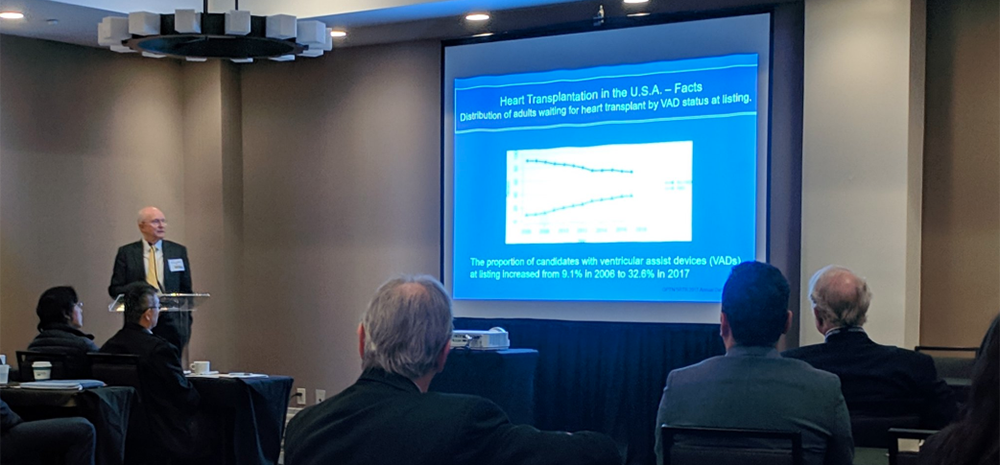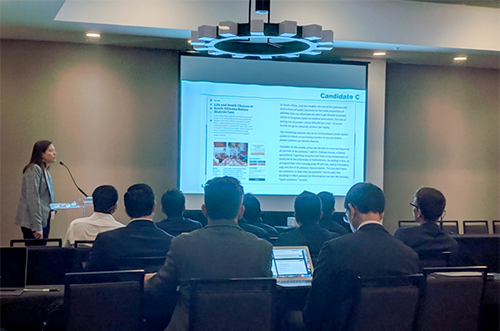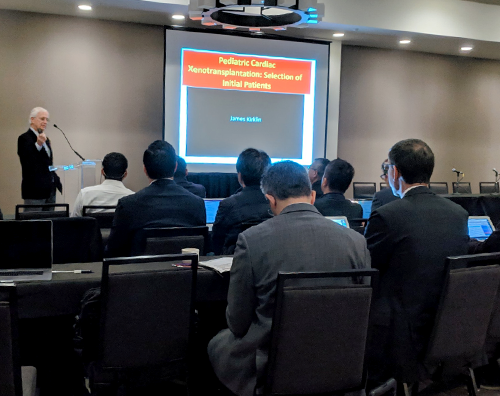 The Division of Cardiothoracic Surgery's Dr. Christopher McGregor discusses how researchers might evaluate and choose patients for future clinical trials at UAB's 2019 "Pathways to Clinical Xenotransplantation" conference at the Hilton Birmingham at UAB on Friday, March 22. (Photo by Daniel Bracker)
The Division of Cardiothoracic Surgery's Dr. Christopher McGregor discusses how researchers might evaluate and choose patients for future clinical trials at UAB's 2019 "Pathways to Clinical Xenotransplantation" conference at the Hilton Birmingham at UAB on Friday, March 22. (Photo by Daniel Bracker)
The UAB xenotransplantation team recently hosted more than 100 regional and international scientists for a two-day conference at the Hilton Birmingham at UAB.
The event, “Pathways to Clinical Xenotransplantation,” gave attendees the opportunity to discuss the current status of the field and various aspects of potential clinical trials, including issues such as patient selection and government regulation. The meeting provided an avenue for UAB faculty, as well as scientists from other academic institutions and government agencies, to speak on several topics related to xenotransplantation.
The conference – held Thursday, March 21, and Friday, March 22 – kicked off with warm welcomes from UAB Department of Surgery Chair Herbert Chen, M.D., UAB Division of Transplantation Director Devin Eckhoff, M.D., and International Xenotransplantation Association President Leo Bühler, M.D., on Thursday morning.
Following these opening remarks, the event’s first session began as a review of what is currently happening in the field of xenotransplantation research, while the day’s remaining sessions explored the challenges of preparing genetically modified pigs as sources of organs for xenotransplantation.
Several UAB faculty members – including the Department of Surgery’s Joseph Tector, M.D., Ph.D.; David K. C. Cooper, M.D., Ph.D., FRCS; Christopher McGregor, M.B., FRCS, M.D. (Hon.); Matthew Tector, Ph.D., and Guerard Byrne, Ph.D. – gave talks on the existing body of xenotransplantation research, with a particular emphasis on the rapidly improving results that have been reported in recent years.
Invited speaker David Ayares, Ph.D., CEO and CSO of Revivicor, Inc., discussed the production of organ-source pigs, while Harvard Medical School’s Jay Fishman, M.D., spoke about the potential risks of infection in those pigs.
 UAB transplant surgeon Dr. Jayme Locke presents at UAB's 2019 xenotransplantation conference at the Hilton Birmingham at UAB. (Photo by Daniel Bracker)
UAB transplant surgeon Dr. Jayme Locke presents at UAB's 2019 xenotransplantation conference at the Hilton Birmingham at UAB. (Photo by Daniel Bracker)
That afternoon, four internationally known experts on clinical or experimental organ allotransplantation – Stuart Knechtle, M.D., from Duke University; Robert Montgomery, M.D., from New York University; Stanley Jordan, M.D., from Cedars-Sinai Medical Center in Los Angeles; and Jeffrey Platt, M.D., from the University of Michigan – discussed topics relating to the problem of antibody-mediated rejection of allografts, and their relevance to xenotransplantation.
The second day of the conference was spent discussing potential clinical trials in xenotransplantation, with a focus on patient selection for future kidney and heart trials, as well as the government perspective on these trials. McGregor and two of his fellow UAB surgical faculty, Jayme Locke, M.D., MPH, and James Kirklin, M.D., presented on these topics during the event’s Friday morning session.
Others closed out the day’s remaining session by addressing the regulatory and economic aspects of xenotransplantation clinical trials. Of note, a representative from the U.S. Food and Drug Administration, Winson Tang, M.D., made it clear during his talk that the FDA expects such clinical trials to initially include subjects with life-threatening disease.
 Dr. James Kirklin, UAB professor of cardiothoracic surgery, discusses which pediatric heart conditions may be potential opportunities for future xenotransplantation at UAB's 2019 xenotransplantation conference. (Photo by Daniel Bracker)
Dr. James Kirklin, UAB professor of cardiothoracic surgery, discusses which pediatric heart conditions may be potential opportunities for future xenotransplantation at UAB's 2019 xenotransplantation conference. (Photo by Daniel Bracker)
The final presentation was given by Jon Friedman, M.D., the chief medical officer of medical benefit management at Optum Specialty Management, a health services company headquartered in Minnesota. Friedman’s talk acknowledged the many variables that might affect the financial costs associated with xenotransplantation but suggested that, if xenotransplantation were to become a common practice, it could eventually reduce these expenses, for example, by greatly reducing the number of patients requiring chronic dialysis.
A number of speakers also participated in panel discussions on various topics related to xenotransplantation throughout the two-day event. In addition to the speakers previously listed above, these panels included Robert S. Gaston, M.D., professor emeritus in the UAB Department of Medicine; Judith Arcidiacono, regulatory scientist at the FDA; Karl Kraebber, director of xenotransplantation operations at UAB; Ronald A. Evans, director of revenue integrity at UAB; and Martha Tankersley, transplant administrator at UAB.
In his closing remarks on Friday afternoon, Eckhoff praised the high standards of all of the presentations and speakers, as well as the event’s discussion sessions, during which speakers and attendees had the opportunity to share the breadth of their knowledge with one another in a collaborative environment.
“There is little doubt that the conference resulted in the clarification of what preparations will be required by groups pursuing the goal of clinical organ xenotransplantation,” Cooper said at the meeting’s conclusion. “The initiation of the first clinical trial is one step closer.”
The full proceedings of the conference will be published in a book by Springer.
[Daniel Bracker contributed to this report.]